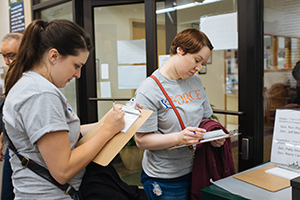Food bank volunteers have super powers – by David Sarasohn
Food bank volunteers have super powers – by David Sarasohn
June 19, 2017 – Volunteers have a lot of identities at Oregon Food Bank. They are food sorters, nutrition and cooking teachers and, in hundreds of storerooms and church basements across the state, greeters and helpers for Oregonians who need a little help.
“We have so many programs that only work due to volunteers,” says Jeff Kleen, public policy analyst at Oregon Food Bank.
But volunteers also have another identity, not exactly secret but maybe a little overlooked – they’re constituents.
And when constituents talk, elected officials listen.
And thousands of constituents can be very loud.
In the course of a year, Oregon Food Bank hosts 36,000 volunteers – that’s 36,000 constituents – who work in its spaces in Northeast Portland and Beaverton, not even counting volunteers in food pantries all over the state. Right now, Congress really needs to hear from them.
“The first line of defense against hunger,” is how Kleen describes the federal food stamp program, or SNAP, the Supplemental Nutrition Assistance Program. At the height of the recession, one in five Oregonians were getting some help from SNAP – maybe a hundred dollars or two a month to spend at local supermarkets. It’s now one in six. Oregon, one of the hungriest states in the country in the 1990s, improved its situation through outreach campaigns to increase the enrollment of its eligible population in SNAP; the state now has the fifth highest enrollment rate in the country.
Oregon Food Bank has its own measure of the importance of SNAP – the lines at food pantries. Those get longer at the end of the month, when SNAP benefits tend to run out.
But SNAP is not only a major force against hunger, it’s a major target. Once, food stamps were a bipartisan priority. But for years, House Republicans have pushed to cut SNAP, or roll it into an underfunded state block grant with other programs. The drive is now bolstered by an administration budget that would cut food stamps by a quarter over the next decade, and push more costs to already strapped states.
Congress needs to hear from its constituents who care about hunger – constituents who care enough about hunger to volunteer to sort groceries.
 Oregon Food Bank is asking its volunteers to sign postcards to be delivered to Oregon’s U.S. senators – the Senate is the most promising place to apply skids on a greased path to more hungry Americans – pointing out the importance of the program. So far, getting signatures from food bank volunteers has not exactly been a hard sell.
Oregon Food Bank is asking its volunteers to sign postcards to be delivered to Oregon’s U.S. senators – the Senate is the most promising place to apply skids on a greased path to more hungry Americans – pointing out the importance of the program. So far, getting signatures from food bank volunteers has not exactly been a hard sell.
“Usually, folks can’t wait to get to the clipboard to sign the postcard,” reports Nicole Forbes, who works on community involvement for the food bank. With a goal of 2,000 postcards by August, they’ve already collected 1,200.
The process is even easier after volunteers have been told a little about SNAP and that the program provides an average of $1.26 per meal.
Forbes recalls one volunteer responding, “Are you kidding me about that? I just spent $3 on a latte.”
Oregon’s senators, Ron Wyden and Jeff Merkley, might not seem the most vital targets for a postcard campaign; they’re both longtime stalwarts for food stamps. But as Kleen points out, there’s a tough budget time coming, “SNAP will be up against a lot of other priorities. The postcard campaign can help keep it at the top.”
Besides, everybody likes to get mail.
“I think it’s great,” says Merkley about the prospect of his office getting postcards in numbers that are weighed instead of just counted. “We need a lot more citizen involvement.” He adds, “I’m already on their team, but whenever people send me a big stack of postcards, it’s a way for me to remind my colleagues how many people care about this.”
It also reminds people bagging produce that along with being volunteers, they have another powerful identity – that of constituent.
